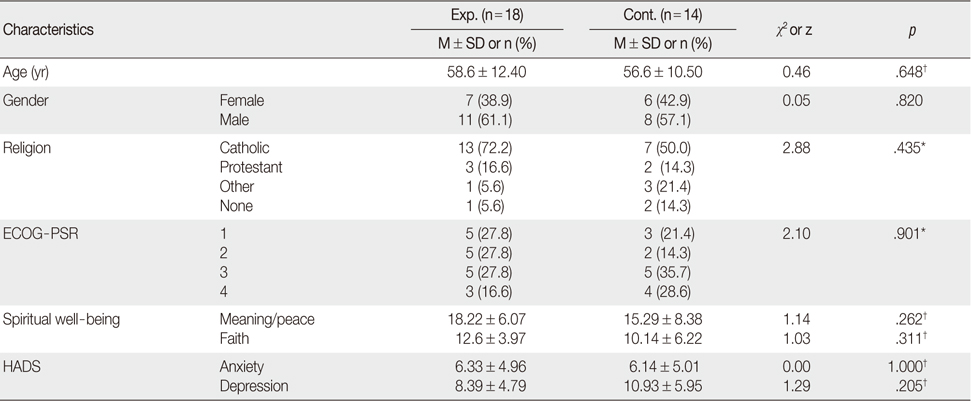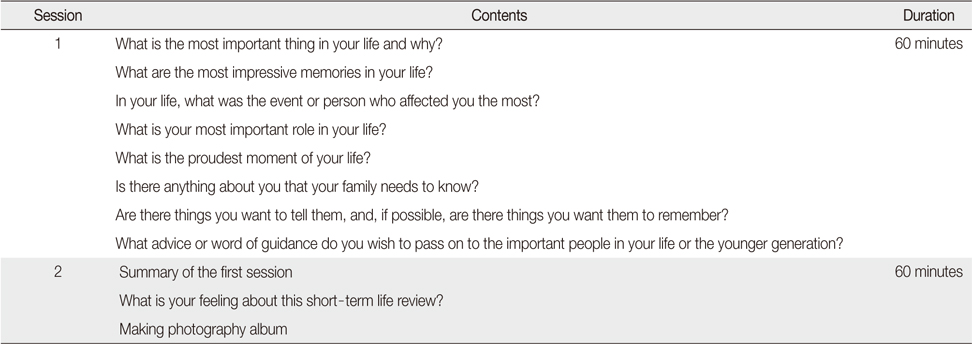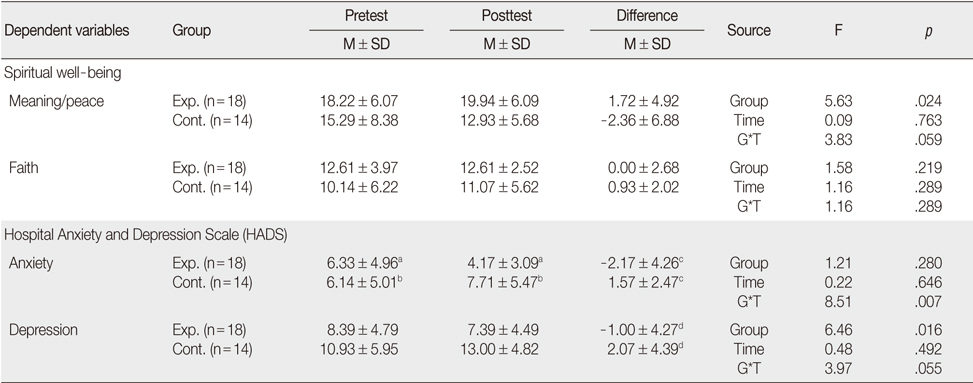Articles
- Page Path
- HOME > J Korean Acad Nurs > Volume 42(1); 2012 > Article
-
Original Article
- Effects of a Short-term Life Review on Spiritual Well-being, Depression, and Anxiety in Terminally Ill Cancer Patients
- Sung Hee Ahn, Young Lan An, Yang Sook Yoo, Michiyo Ando, Soo Jin Yoon
-
Journal of Korean Academy of Nursing 2012;42(1):28-35.
DOI: https://doi.org/10.4040/jkan.2012.42.1.28
Published online: February 29, 2012
1Professor, College of Nursing, The Catholic University of Korea, Seoul, Korea.
2Director, Hospice Coaching Center, Seoul, Korea.
3Professor, College of Nursing, The Catholic University of Korea, Seoul, Korea.
4Professor, St. Mary's Nursing College, Fukuoka, Japan.
5Team leader, Mohyun Hospice Center, Seoul, Korea.
- Address reprint requests to: Ahn, Sung Hee. College of Nursing, The Catholic University of Korea, 505 Banpo-dong Seocho-gu, Seoul 137-701, Korea. Tel: +82-2-2258-7409, H·P: 010-9975-1299, Fax: +82-2-2258-7772, shahn@catholic.ac.kr
© 2012 Korean Society of Nursing Science
- 1,394 Views
- 43 Download
- 14 Crossref
Abstract
-
Purpose
- This study was done to evaluate the effects of a short-term life review on spiritual well-being, depression, and anxiety in patients with terminal cancer.
-
Methods
- The study used a pre posttest quasi experimental design with a nonequivalent control group. Measurement instruments included the Functional Assessment of Chronic Illness Therapy-Spiritual scale (FACIT-Sp12) and the Hospital Anxiety and Depression Scale (HADS). Participants were 32 patients with terminal cancer who were receiving chemotherapy or palliative care at hospitals or at home. Eighteen patients were assigned to the experimental group and 14 to the control group. A sixty minute short-term life review session was held twice a week as the intervention with the experimental group.
-
Results
- There was a statistically significant increase in spiritual well-being in the experimental group compared to the control group. There were also significant decreases in depression and anxiety in the experimental group compared to the control group.
-
Conclusion
- The results indicate that a short-term life review can be used as a nursing intervention for enhancing the spiritual well-being of patients with terminal cancer.
This study was supported by Songeui basic science research grant funded by The Catholic University of Korea in 2007.
- 1. Ando M., Morita T., Ahn S.H., Marquez-Wong F., Ide S. International comparison study on the primary concerns of terminally ill cancer patients in short-term life review interviews among Japanese, Koreans, and Americans. Palliative and Supportive Care. 2009;7:349–355.ArticlePubMed
- 2. Ando M., Morita T., Akechi T., Okamoto T. Efficacy of short-term life-review interviews on the spiritual well-being of terminally ill cancer patients. Journal of Pain and Symptom Management. 2010;39:993–1002.ArticlePubMed
- 3. Ando M., Morita T., Okamoto T., Ninosaka Y. One-week short-term life review interview can improve spiritual well-being of terminally ill cancer patients. Psycho-oncology. 2008;17:885–890.ArticlePubMed
- 4. Ando M., Tsuda A., Moorey S. Preliminary study of reminiscence therapy on depression and self-esteem in cancer patients. Psychological Reports. 2006;98:339–346.ArticlePubMedPDF
- 5. Ando M., Tsuda A., Morita T. Life review interviews on the spiritual well being of terminally ill cancer patients. Supportive Care in Cancer. 2007;15:225–231.ArticlePubMedPDF
- 6. Bohlmeijer E., Smit F., Cuijpers P. Effects of reminiscence and life review on late-life depression: A meta-analysis. International Journal of Geriatric Psychiatry. 2003;18:1088–1094.ArticlePubMed
- 7. Chang W.S., Lee J.M. The effect of group reminiscence therapy on depression, quality of life and social behavior of patient with dementia. Journal of Welfare for the Aged. 2006;34:239–270.
- 8. Chochinov H.M., Hack T., Hassard T., Kristjanson L.J., McClement S., Harlos M. Dignity therapy: A novel psychotherapeutic intervention for patients near the end of life. Journal of Clinical Oncology. 2005;23:5520–5525.ArticlePubMed
- 9. Cohen J. Statistical power analysis for the behavioral science. 1988;2nd ed. Hillsdale, NJ, Lawrence Earlbaum Associates.
- 10. Fisher J.W., Francis L.J., Johnson P. Assessing spiritual health via four domains of spiritual wellbeing: The SH4DI. Pastoral Psychology. 2000;49:133–145.ArticlePDF
- 11. Haber D. Life review: Implementation, theory, research, and therapy. International Journal of Aging and Human Development. 2006;63:153–171.ArticlePubMedPDF
- 12. Hills J., Paice J.A., Cameron J.R., Shott S. Spirituality and distress in palliative care consultation. Journal of Palliative Medicine. 2005;8:782–788.ArticlePubMed
- 13. Jenko M., Gonzalez L., Alley P. Life review in critical care: Possibilities at the end of life. Critical Care Nurse. 2010;30:17–27.ArticlePubMedPDF
- 14. Jin B.S., Jeon M.Y. The effect of a group reminiscence therapy on the psychological components of the senile dementia. Journal of the Korea Gerontological Society. 2000;20:183–194.
- 15. Kemp C. Ferrell B.R., Coyle N. Spiritual care interventions. In: Textbook of palliative nursing. 2006;New York, NY, Oxford University Press. 595–604.
- 16. Kim K.B., Yun J.H., Sok S.R. Effects of individual reminiscence therapy on older adults' depression, morale and quality of life. Journal of Korean Academy of Nursing. 2006;36:813–820.ArticlePubMedPDF
- 17. Kim N.C., Yoo Y.S., Han S.W. The effect of reminiscence with audio-visual stimulation on senile dementia. Journal of Korean Academy of Nursing. 2000;30:98–109.ArticlePDF
- 18. McClain C.S., Rosenfeld B., Breitbart W. Effect of spiritual wellbeing on end-of-life despair in terminally-ill cancer patients. Lancet. 2003;361:1603–1607.ArticlePubMed
- 19. Oh S.M., Min K.J., Park D.B. A study on the standardization of the hospital anxiety and depressed scale for Koreans. Journal of the Korean Neuropsychiatric Association. 1999;38:289–296.
- 20. Oken M.M., Creech R.H., Tormey D.C., Horton J., Davis T.E., McFadden E.T, et al. Toxicity and response criteria of the Eastern Cooperative Oncology Group. American Journal of Clinical Oncology. 1982;5:649–655.ArticlePubMed
- 21. Peterman A.H., Fitchett G., Brady M.J., Hernandez L., Cella D. Measuring spiritual well-being in people with cancer: The functional assessment of chronic illness therapy-Spiritual Well-being Scale (FACIT-Sp). Annals of Behavioral Medicine. 2002;24:49–58.ArticlePubMed
- 22. Rades D., Rudat V., Veninga T., Stalpers L.J., Hoskin P.J., Schild S.E. Prognostic factors for functional outcome and survival after re-irradiation for in-field recurrences of metastatic spinal cord compression. Cancer. 2008;113:1090–1096.ArticlePubMed
- 23. Zigmond A.S., Snaith R.P. The hospital anxiety and depression scale. Acta Psychiatrica Scandinavica. 1983;67:361–370.ArticlePubMed
- 24. Wilson K.G., Chochinov H.M., Skirko M.G., Allard P., Chary S., Gagnon P.R, et al. Depression and anxiety disorders in palliative cancer care. Journal of Pain and Symptom Management. 2007;33:118–129.ArticlePubMed
REFERENCES

*Fisher's exact test; †Wilcoxon signed rank sum test;
Exp.=Experimental group; Cont.=Control group; ECOG-PSR=Eastern cooperative oncology group - performance status Rating; HADS=Hospital anxiety and depression scale; 1=Fully ambulatory with symptoms; 2=Requiring rest for 1 to 49% of the waking day; 3=Requiring rest 50 to 99% of the waking day; 4=Requiring complete bed rest.
Figure & Data
REFERENCES
Citations

- Research Progress on Lung Cancer Patients' Sense of Meaning of Life
Xinrui Lin, Shanshan Qu, Yue Yang, Xiaoge Ding, Yinji Jin
Nursing and Health Research.2025; 4(3): 28. CrossRef - The effectiveness of reminiscence therapy on anxiety, depression, and quality of life in adult cancer patients: a systematic review and meta-analysis
Canan Bozkurt, Öznur Erbay-Dalli, Yasemin Yildirim
Supportive Care in Cancer.2024;[Epub] CrossRef - The Efficacy of Reminiscence Therapy in Cancer-Related Symptom Management: A Systematic Review and Meta-Analysis
Jie Sun, Jieting Jiang, Yiyan Wang, Mingyue Zhang, Lu Dong, Kunpeng Li, Caiqin Wu
Integrative Cancer Therapies.2023;[Epub] CrossRef - Studying the Effect of Life Review Therapy on Psychological Well-being and Anxiety of Teenage Girls in Divorced Families
Fatemeh Bay, Alireza Ghorbani
Iranian Evolutionary and Educational Psychology.2023; 5(2): 145. CrossRef - Effects of a Mind Map–Based Life Review Program on Anxiety and Depressive Symptoms on Cancer Patients Undergoing Chemotherapy
Ying Chen, Jianwei Zheng, Huimin Xiao, Xiaoyan Lin, Xiaoling Zhang
Cancer Nursing.2022; 45(1): E116. CrossRef - Dignity therapy for effective palliative care: a literature review
Se-Ryun Park, Yu-Jung Cha
Kosin Medical Journal.2022; 37(3): 192. CrossRef - The Effect of Hospice Patients' Pain, Anxiety, Depression, Perception of Dignity, and Spiritual Well-Being on their Attitudes toward Dignified Death
Yun Sil Ahn, Pok Ja Oh
Korean Journal of Adult Nursing.2021; 33(3): 212. CrossRef - Development of a One-item Screening Question to Assess Spiritual Well-Being for Advanced Cancer Inpatients in Korea
Youngmin Park, Sang-Yeon Suh, Sun-Hyun Kim, Jeanno Park, Seok Joon Yoon, Yu Jung Kim, Beodeul Kang, Jung Hye Kwon, Kwonoh Park, David Hui, Hyeon Jeong Kim, Sanghee Lee, Hong-Yup Ahn
Journal of Pain and Symptom Management.2021; 62(5): 910. CrossRef - Verbal responses, depressive symptoms, reminiscence functions and cognitive emotion regulation in older women receiving individual reminiscence therapy
Dongmei Wu, Taolin Chen, Hao Yang, Qiyong Gong, Xiuying Hu
Journal of Clinical Nursing.2018; 27(13-14): 2609. CrossRef - Developing a mind map–based life review program to improve psychological well‐being of cancer patients: a feasibility study
Ying Chen, Huimin Xiao, Xiaoyan Lin
Psycho-Oncology.2018; 27(1): 339. CrossRef - Spiritual Well-being Among Palliative Care Patients With Different Religious Affiliations: A Multicenter Korean Study
Seok Joon Yoon, Sang-Yeon Suh, Sun Hyun Kim, Jeanno Park, Yu Jung Kim, Beodeul Kang, Youngmin Park, Jung Hye Kwon, Kwonoh Park, Dong Wook Shin, Hyeon Jeong Kim, Hong-Yup Ahn, David Hui
Journal of Pain and Symptom Management.2018; 56(6): 893. CrossRef - Anxiety and Spiritual Well-Being in Nursing Students: A Cross-Sectional Study
Jéssika Leão Fabbris, Ana Cláudia Mesquita, Sílvia Caldeira, Ana Maria Pimenta Carvalho, Emilia Campos de Carvalho
Journal of Holistic Nursing.2017; 35(3): 261. CrossRef - The effects of life review interventions on spiritual well-being, psychological distress, and quality of life in patients with terminal or advanced cancer: A systematic review and meta-analysis of randomized controlled trials
Chong-Wen Wang, Amy YM Chow, Cecilia LW Chan
Palliative Medicine.2017; 31(10): 883. CrossRef - Effects of Dignity Interventions on Psychosocial and Existential Distress in Terminally ill Patients: A Meta-analysis
Pok Ja Oh, Sung-Rae Shin
Journal of Korean Academy of Nursing.2014; 44(5): 471. CrossRef
Homogeneity Test for General Characteristics, Performance Status, and Outcome Variables of Participants (N=32)
*Fisher's exact test; †Wilcoxon signed rank sum test;
Exp.=Experimental group; Cont.=Control group; ECOG-PSR=Eastern cooperative oncology group - performance status Rating; HADS=Hospital anxiety and depression scale; 1=Fully ambulatory with symptoms; 2=Requiring rest for 1 to 49% of the waking day; 3=Requiring rest 50 to 99% of the waking day; 4=Requiring complete bed rest.
Composition for Short-Term Life Review
Effects of Short-term Life Review on Spiritual Well-being, Anxiety, and Depression
a, b, c, d=Significant difference between the same αbetic letters;
Exp.=Experimental group; Cont.=Control group; G=Group; T=Time.
*Fisher's exact test; †Wilcoxon signed rank sum test; Exp.=Experimental group; Cont.=Control group; ECOG-PSR=Eastern cooperative oncology group - performance status Rating; HADS=Hospital anxiety and depression scale; 1=Fully ambulatory with symptoms; 2=Requiring rest for 1 to 49% of the waking day; 3=Requiring rest 50 to 99% of the waking day; 4=Requiring complete bed rest.
a, b, c, d=Significant difference between the same αbetic letters; Exp.=Experimental group; Cont.=Control group; G=Group; T=Time.
 KSNS
KSNS
 E-SUBMISSION
E-SUBMISSION


 Cite
Cite

